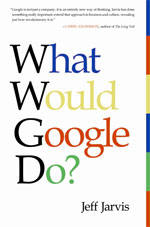
Jeff Jarvis’ enthusiasm for how Google has broken the rules and forged new ones is infectious, if a bit fanboy-ish. Even as he is prone to rather sweeping statements about how not bad but just lame the old days were (we all apparently got caught up in “Who Shot JR” because there was nothing else to choose from), the reader can’t help but pick up the cue from his title and wonder “what if …” in all the scenarios he posits where Google philosophies could be applied to mend many of industry’s and society’s woes. Essentially, Jarvis calls for the openness, transparency and apparent “power to the people” that Google tools and applications provide, and discusses how this could be applied to everything from customer service and car design to politics and governance, education and health care.
Jarvis too blithely dismisses the “privacy warriors” and the reluctance of institutions and individuals of certain ages to just relinquish control, but at the same time, he seems to personally espouse of what he speaks, so at least he has strong convictions about the validity of Google’s approach. He makes everything from his health to his political beliefs very public, and says that he has garnered more benefits from doing so that he has incurred apparent risks. He advocates collaboration, and cites commenters to his blog as helping him to hammer out some of the concepts for this book. In these respects, he lives the somewhat utopian view he has of Google, but he also suggests towards the end that the premise of honesty and connectedness fostered by online openness is perhaps just pragmatism or a fait accompli. Once your whole life is online, it is an easily searchable and traceable vapour trail, so what is the point of trying to hide anything, whether you are seeking love, a new job or public office?
As Jarvis sees it …
“The ethics and expectations of privacy have changed radically in Generation G [Google]. People my age and older fret at all the information young people make public about themselves. I try to explain that this sharing of personal information is a social act. It forms the basis of the connections Google makes possible. When we reveal something of ourselves publicly, we have tagged ourselves in such a way that we can be searched and found under that description. As I said in the chapter on health, I now can be found in a search for my heart condition, afib. That is how others came to me and how we shared information. Publicness brings me personal benefits that outweigh the risks.
“Publicness also brings us collective benefits, as should be made clear by now from the aggregated wisdom Google gathers and shares back with us thanks to our public actions: our searches, clicks, links, and creations. Publicness is a community asset. The crowd owns the wisdom of the crowd and to withhold information from that collective knowledge – a link, a restaurant rating, a bit of advice – may be a new definition of antisocial or at least selfish behavior.”
